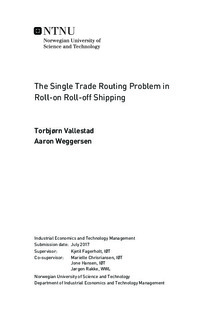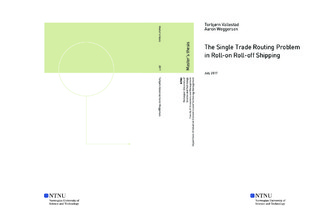| dc.description.abstract | Roll-on/Roll-off shipping is the primary method for transporting vehicles and other types of material which can be rolled onto vessels, over long distances. Low demand and excess capacity have caused global shipping margins to fall to a historic low. However, comparatively little operational research has been done on RoRo shipping, suggesting there is room for improvement. The research done in this thesis is motivated by the conviction that a good decision support system has the potential for significant benefits to RoRo providers in maritime transportation.
In this thesis, we focus on operational decisions related to planning routes for several voyages over a single trade route, as well as plan for which contracts to service and which quantities to load and unload at scheduled port visits. Solving this problem for a single trade route will be an essential building block in solving the problem for several trade routes with dependencies between them.
The objective of this thesis is to gain insights that can help decision makers to reduce and minimize costs. Hence, the aim of the work will be to create a model which reflects the real problem. A mathematical formulation of The Single Trade Routing Problem has been further developed, by introducing new and comprehensive extensions. The model will take into account variable vessel speeds, a heterogeneous fleet where vessels have different capacities and fuel usage, available stowage space estimation, fairly evenly spread requirements, transit time requirements, and differences in capacity and space utilization for different decks within a single vessel.
Computational results show that the mixed integer programming (MIP) model is able to solve small instances within a reasonable time limit. In addition, the results show promising results for using the model as a decision support system, facilitating decision makers to reducing shipping costs. | |

